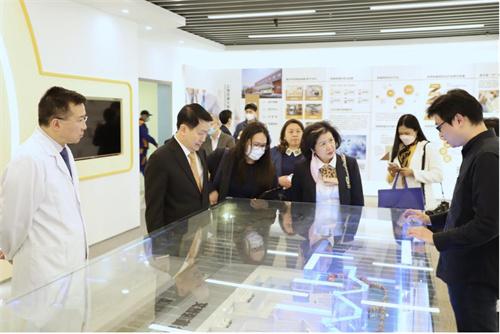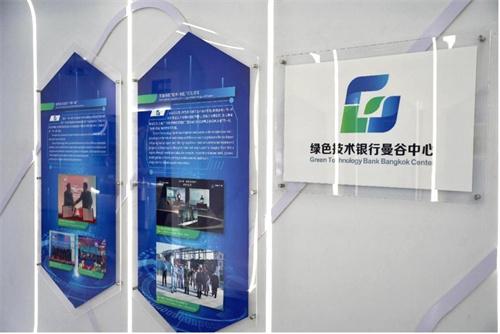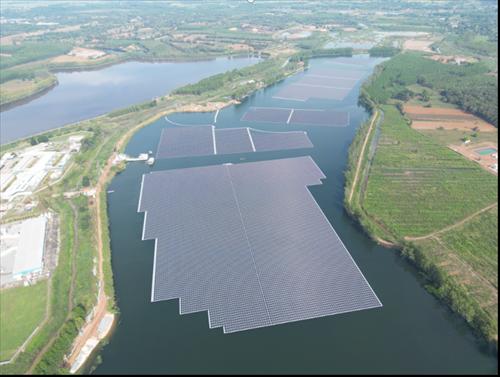The Green Technology Bank Bangkok Center, located in an innovation and entrepreneurship cluster near Chulalongkorn University in Thailand, was recently inaugurated. The vibrant, energetic cluster exactly reflects the thriving China-Thailand cooperation on green technology innovation in recent years.
As the Green Technology Bank's first overseas branch, and cooperating with the Chinese Academy of Sciences (CAS) Innovation Cooperation Center (Bangkok), the Thailand-based Green Technology Bank Bangkok Center strives to serve the entire ASEAN. It builds a bridge of international cooperation to better transfer and translate advanced and applicable green technologies.
"Many Chinese companies new to Thailand are unfamiliar with local laws and unclear on registration processes. We provide professional services to quickly get them up to speed," said Jiang Biao, director of the CAS Innovation Cooperation Center (Bangkok).
A delegation from Thailand's Ramathibodi Hospital visits an exhibition hall of the Ruijin Hospital in Shanghai. (Photo courtesy of the Green Technology Bank Bangkok Center)
According to him, the Green Technology Bank Bangkok Center has been on a tight schedule these days, with many Chinese sci-tech firms coming for cooperation, hoping to implement advanced technologies in Thailand.
In recent years, China-Thailand cooperation on green technology innovation has made continuous progress, and many advanced technologies have already benefited the Thai people.
In March 2020, to combat COVID-19, Thailand's Siam Cement Group urgently procured a batch of high-end Chinese medical imaging equipment through the CAS Innovation Cooperation Center (Bangkok) and donated them to the Ramathibodi Hospital, Mahidol University. This greatly enhanced the efficiency of the hospital's clinical diagnosis.
This April, a delegation from the Ramathibodi Hospital visited Shanghai institutions that had previously extended a helping hand, including United Imaging Healthcare.
The first domestically produced proton therapy system left a deep impression on the Thai side. "This year we will accelerate the application of proton therapy at the Ramathibodi Hospital to further reduce equipment and medical costs for local hospitals, and provide patients with cost-effective medical services," said Jiang.
Photo shows display boards at the Green Technology Bank Bangkok Center. (Photo/Li Yuanxin)
In November 2022, a deal for building Thailand's first 5G-enabled smart autonomous driving mining project was signed in Bangkok. According to the deal, five Chinese and Thai companies will leverage 5G, artificial intelligence, autonomous driving, cloud computing, new energy batteries and more to make a mine of Siam Cement Group in Saraburi Province greener, smarter, more efficient, and safer.
"This is the first overseas smart green mining project built by Chinese companies. It will form a complete closed-loop unmanned solution for the mining industrial chain from construction to production," Jiang explained. This will effectively lower safety risks, enhance productivity, and reduce energy consumption, he added.
Thailand is the world's largest natural rubber producer and exporter, but it has long relied on traditional manual tapping. Tappers always have to get up at 4:00 or 5:00 AM every day to work, which is arduous but inefficient.
"To improve productivity, we are promoting unmanned automated tapping machines and building solar panel canopies to utilize clean energy and reduce electricity costs," said Jiang.
The Green Lake 2x30 MW floating photovoltaic project was connected to the grid in April this year. Constructed by China Energy Engineering Corporation and located in Thailand's Prachinburi 304 Industrial Park, it is the largest floating photovoltaic project in Thailand. (Photo/Chu Xinyan)
The Green Technology Expo 2023 will be held in Bangkok this November. Themed "Towards the Transition to Newer, Cleaner, Sustained Evergreen Technology," it will exhibit the latest green tech innovations around the world.
As a main organizer, the CAS Innovation Cooperation Center (Bangkok) is actively preparing for the expo.
"In recent years Thailand has strongly supported new energy vehicle development. Some Chinese automakers have confirmed their participation in the expo. Companies from ASEAN countries like Vietnam, Laos, Indonesia, and Malaysia have also expressed interest," said Gao Kun, deputy director of the center.
Recently, the expo's second press conference was held in Shanghai, helping Chinese firms reach the Thai market and promoting in-depth China-Thailand exchange on green and low-carbon development as well as energy-conserving technologies.


